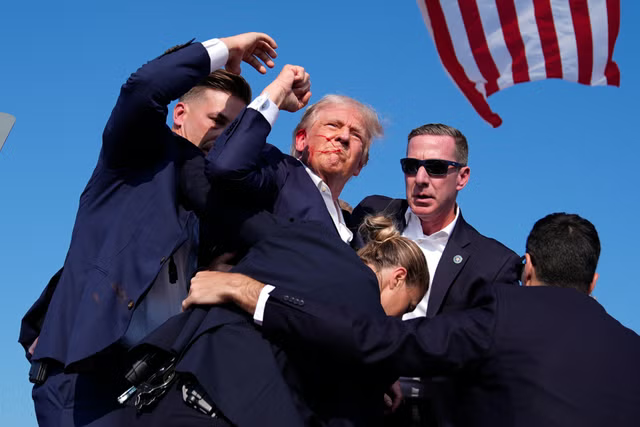Donald Trump has had a surprisingly solid summer, raising the odds, for now, that he’ll win a second presidential term.
That’s why financial markets are reawakening to the “Trump trade,” with varying implications for stocks, bonds, cryptocurrencies, interest rates, and inflation.
Trump’s upturn began with the June 27 presidential debate in which President Joe Biden’s bumbling raised more questions than ever about the incumbent’s age and stamina. Ever since a swelling chorus of Democrats has been calling for Biden to withdraw and let Vice President Kamala Harris or another younger Democrat take on Trump.
Trump survived a July 13 assassination attempt and appointed the first millennial to a national ticket by choosing J.D. Vance as his vice presidential running mate. Former Trump challengers lined up behind the former president at the Republican convention, an uncharacteristic show of unity in an otherwise fractious party.
Trump himself seems to be steering to the centre, perhaps in a bid to win swing voters and mainstream business backers. In an interview with Bloomberg Businessweek, he sought to assuage Wall Street fears of chaos in a second term. He said he’d probably keep Fed Chair Jerome Powell in the job through the end of his term in 2026, “especially if I thought he was doing the right thing.” That means lowering interest rates, but only during a Trump presidency—not in the fall, when it might help Biden.
Trump tried to assure investors there would be no unusual inflation caused by new tariffs without explaining how he’d work that magic. He even suggested he’d consider JPMorgan Chase CEO Jamie Dimon for Election scenarios that are now nudging earnings and inflation off the radar screen as top investor concerns. “‘Animal spirits’ have taken on a whole new head of steam because of this growing feeling that Donald Trump is going to emerge victorious,” economist David Rosenberg of Rosenberg Research wrote to clients on July 17. “No wonder investors are foaming at the mouth.”
Betting markets — which can be spurious — now give Trump 66% odds of winning, according to the RealClearPolitics average. That suggests rising odds of not just a Trump win but of a Republican sweep in which the GOP wins both houses of Congress, too, giving it unified control of the government.
That would open the door to more corporate tax cuts, which Democrats would likely block if they controlled at least one chamber of Congress. Rosenberg views the GOP sweep scenario as a contributor to the recent investor rotation out of tech stocks into smaller companies deemed value stocks on the theory that more tax cuts would help smaller shares catch up in value to the so-called Magnificent Seven.
Cryptocurrencies have been another beneficiary of Trump’s rising fortunes. Trump, once a crypto sceptic, now pledges to end government efforts to regulate crypto in a bid to capture younger voters smitten with the trend. The value of bitcoin jumped by $1,000 during the first hour after Trump survived the July 13 shooting as buyers bet the failed assassination would boost Trump’s election odds. During the next four days, bitcoin rose by another $4,500. Most other cryptos followed bitcoin higher.
But the outlook for a second Trump presidency isn’t entirely bullish.
For instance, Trump’s plans to boost import tariffs and roust undocumented immigrants out of the country are both inflationary since they would raise the prices of imported goods on their face and probably also boost labour costs by making workers in some industries more scarce.
That could undo the considerable progress of the last two years, with inflation falling sharply from its 2022 peak, prompting hope that the Federal Reserve could start cutting interest rates as soon as September. Any sign of resurgent inflation — including possible Trump policies — could interfere with that and keep interest rates elevated. Some analysts think interest rates are already higher than they would otherwise be because investors are beginning to price in the effect of inflationary Trump policies.


